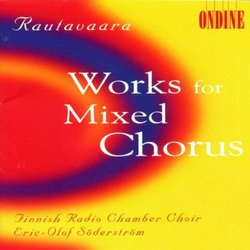| All Artists: Einojuhani Rautavaara, Mia Huhta, Olli Hannuksela Title: Rautavaara: Works for Mixed Chorus Members Wishing: 0 Total Copies: 0 Label: Ondine Release Date: 2/20/1996 Genres: Folk, Classical Styles: Opera & Classical Vocal, Sacred & Religious Number of Discs: 1 SwapaCD Credits: 1 UPC: 761195085127 |
Search - Einojuhani Rautavaara, Mia Huhta, Olli Hannuksela :: Rautavaara: Works for Mixed Chorus
 | Einojuhani Rautavaara, Mia Huhta, Olli Hannuksela Rautavaara: Works for Mixed Chorus Genres: Folk, Classical
|
Larger Image |
CD Details |
CD ReviewsA master at work Richard A. Cavalla | NJ, USA | 05/03/2000 (5 out of 5 stars) "Largely known for his orchestral works like the Cantus Arcticus and the "Angel of Light" symphony, Einojuhani Rautavaara is also a master composer for choir. This disc collects 10 of his secular works for chorus a cappella, and contains no less than two masterpieces.
The disc starts with two short works based on Finnish folk songs where we hear, already, a Rautavaara trademark: multi-part writing with melodic lines that seem to almost wrap around each other, finally emerging into a complex and gorgeous whole. Next is a work, in four sections, for Sprechchor based on pieces from a German conversational dictionary. None of the sections is more than two minutes, so the Sprechchor do not outstay their welcome. The result is absurd and comedic while also being intensely serious. Next come two more settings of folk songs, these coming from Swedish speaking sections of Finland. Rautavaara manages to keep the freshness and charm of the folk origins while not sacrifying depth or sophistication. The first and greatest of the masterpieces that I mentioned previously comes next, the 17-minute epic Katadralen. It employs a myriad of color, tone, and austere beauty. I often find it hard to believe that Rautavaara can create such rich, nearly symphonic sounds from a chamber choir. An intense and dramatic suite based on the poems of Lorca follows. After that is another work for Sprechchor, the very brief Ludus verbalis. The next work, Nirvana Dharma, is accompanied by flute and is also the only work in English. Its writing is very complex, as necessitated by the poetry it is based on, which uses semi-recursive patterns to portray the search for enlightenment. The last track, Die erste Elegie, after poetry by Rilke, is the second masterpiece on the disc. It is often brooding and gloomy. Keep an eye out for the line, "Each and every angel is terrifying", which is the origin of many of Rautavaara's works that reference angels. In conclusion, works that are not to be missed. After this disc, make sure to check out the same composer's Vigilia to get a taste for his sacred writing." |

 Track Listings (19) - Disc #1
Track Listings (19) - Disc #1